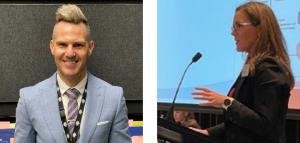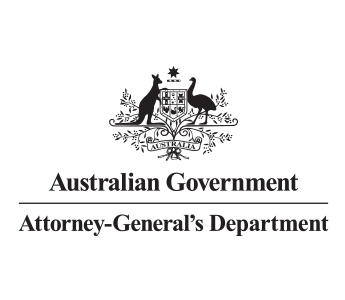Continuing our journey to build data capability
During our first Fraud Data Sharing and Analytics Conference in 2019, we listened – starry eyed – to the UK’s Rob Malcomson and Mark Cheeseman OBE tell their story. They showcased the successful work of the UK’s Counter Fraud Function to deliver data pilots to find and prevent fraud. We recall the feelings of excitement at the time, thinking about all the possibilities here in Australia. We also recall thinking how far we still had to go in our own journey.
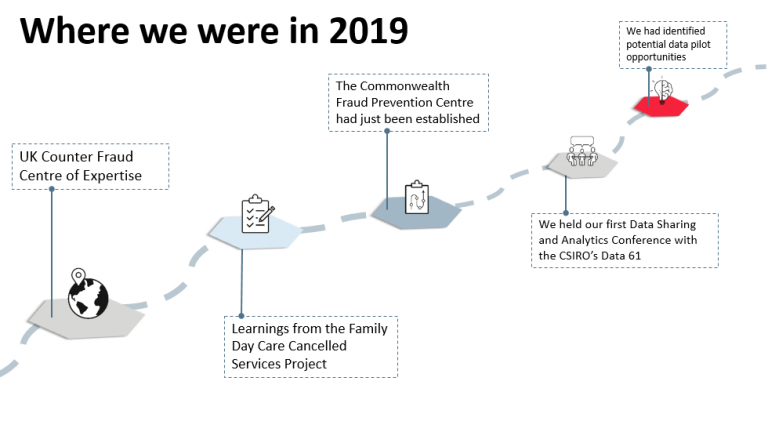
Fraud was (and remains) one of the most underestimated problems affecting governments across the globe. It directly opposes the role of government by draining finite resources away from the essential services and public good that governments deliver for their citizens. We recognised early on that building fraud data capability was going to be a big part of the Centre’s role in strengthening counter fraud arrangements across the Australian Government. Data is a powerful tool to strengthen the integrity of government services, unlock insights to identify and prevent potential fraud, and drive improvements and innovation to government services and client experience. In recognition of this, our senior leaders have directed us to prioritise strengthening information sharing to counter fraud.
Our recent Fraud Data Sharing and Analytics Conference
We are pleased to report that our Fraud Data Sharing and Analytics Conference in April 2021 demonstrated the significant progress we have made since 2019. During the conference we were also able to share the results of successful projects delivered by the Centre, including:
- our Data Sharing Pilots Leading Practice Guide, which brings together key learnings and leading practice from data sharing pilots conducted in Australia and the UK
- our Information Sharing Mapping Project, which has helped us:
- test assumptions around information sharing
- better understand the environment and the factors that influence it
- provide informed advice and policy on information sharing
- identify practical and concrete opportunities to strengthen capability.
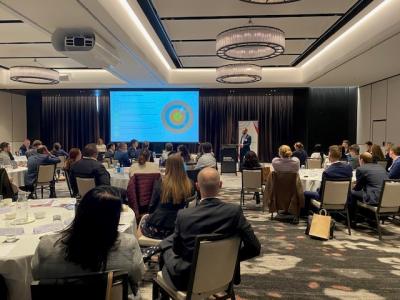
The conference program also included presentations from international and domestic experts working in the field of counter fraud and data analytics.
Mark Cheeseman, Director of the UK Government's Counter Fraud Function presented on international fraud during the COVID-19 pandemic and provided examples of UK advancements in fraud analytics and data sharing.
Dr Liming Zhu, Research Director at CSIRO’s Data61 provided insight into Australian innovation and gave an overview of some collaborative projects Data61 is engaged in with Australian Government partners.
The Australian Charities and Not-for-profits Commission and the Department of Health presented a detailed case study of a successful data sharing pilot undertaken with our support in 2020.
Ben Lumley from Deloitte, provided an overview of his experience working with several government entities to successfully enhance fraud analytics capability across the Australian Government.
The afternoon sessions focused on opportunities for developing shared future projects and the workshopping of legislative, policy and other barriers to effective data sharing. These practical sessions helped us identify new data sharing pilot opportunities to take forward over this financial year.
The progress we have made to date to build fraud data capability would not have been possible without the support of our data pilot partners, the UK Centre for Counter Fraud Expertise, and other stakeholders who have assisted our Centre’s work and projects over the last couple of years.
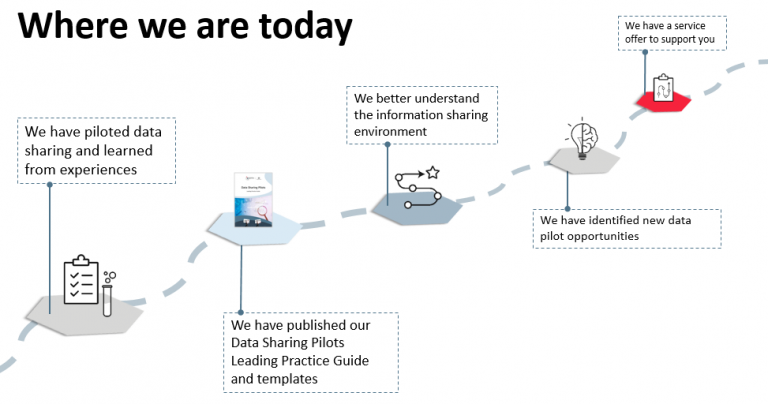
Our collaboration to strengthen fraud data capability extends internationally
The power of this collaboration was on full display during a recent International Data Forum on Pandemic Response Oversight. We partnered with the US Pandemic Response Accountability Committee (PRAC) to organise the forum, which aimed to facilitate discussions among experts and oversight professionals from the US, UK, and Australia about challenges they faced and the innovative ways they used data to prevent and detect fraud during the COVID 19 pandemic.
The forum, on held on 2 July 2021 at 5am AEST, was attended by hundreds of international fraud and data professionals. Presenters from the US, UK, and Australia provided case studies on oversight challenges they faced, and how through the use of data sharing and analytics, they helped to maintain the integrity of pandemic response programs.
Colleagues from the Australian Taxation Office (ATO) and Services Australia presented case study examples of the Pandemic Leave Disaster Payment (Services Australia) and the Early Release of Superannuation Scheme (ATO). The JobKeeper and JobSeeker (Temporary Coronavirus Supplement) was jointly presented by the ATO and Services Australia.
Brett Martin, Assistant Commissioner (Transnational Crime Program) from the ATO joined counterparts from the US and UK in an international panel discussion on overcoming challenges to cross-agency collaboration.
The forum resulted in invaluable discussion of common challenges and facilitated the development of new international relationships. We wish to thank our colleagues from Services Australia and the ATO who delivered presentations and to Brett Martin for providing expert advice from the Australian context.
As we look to our future, improving fraud data capability will continue to remain an important priority for the Centre. Not only are we continuing to support data sharing pilots, we will also be delivering projects to continue to build knowledge and capability to use data analytics to find and prevent fraud.
We are even more excited now than we were in 2019 about the possibilities we can achieve here in Australia. Now we have a firm foundation to build upon, the feelings of trepidation are gone. We also believe more than ever that we can unlock the power of data to reinforce the integrity of government programs and protect our services and citizens against the financial and human impacts of fraud.
Authors: Christopher McDermott and Kate Giltrap
